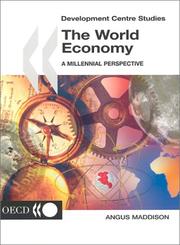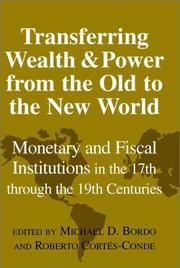| Listing 1 - 2 of 2 |
Sort by
|

ISBN: 9264186085 9789264189980 9789264186088 9786610030842 1280030844 926418998X Year: 2001 Publisher: Paris : OECD Publishing,
Abstract | Keywords | Export | Availability | Bookmark
 Loading...
Loading...Choose an application
- Reference Manager
- EndNote
- RefWorks (Direct export to RefWorks)
Angus Maddison provides a comprehensive view of the growth and levels of world population since the year 1000 when rich countries of today were poorer than Asia and Africa. The gap between the world leader, the US and the poorest region, Africa, is now 20:1. The book has several objectives. The first is a pioneering effort to quantify the economic performance of nations over the very long term. The second is to identify forces which explain the success of the rich countries, and explore the obstacles which hindered advance in regions which lagged behind. The third is to scrutinise the interaction between the rich and the rest to assess the degree to which this relationship was exploitative. The book is a monumental work of reference and a sequel to the author's Monitoring the World Economy: 1820-1992, published in 1995 and his 1998 Chinese Economic Performance in the Long Run. It is a "must" for all scholars and students of economics and economic history, as well as a mine of fascinating facts for everyone else.
International economic relations --- World history --- Organisation for Economic Co-operation and Development --- Economic development --- Economic history --- Gross domestic product --- Income distribution --- Population --- commerce mondial --- developpement economique --- economie --- #ECO:01.01:economie algemeen --- #ECO:01.15:economie statistiek evolutie previsie --- 331.100 --- AA / International- internationaal --- Arbeidsmarkt 331.52 --- Arbeidsomstandigheden 658.382 --- Bevolking 312 --- Economische ontwikkeling 330.35 --- Economische toestand 338.1 --- OESO / OCDE / OECD 339.92OECD --- Productiviteit 338.31 --- 330.34 --- 338 <09> --- 460 Economie --- #A0110A --- Historical demography --- Vital statistics --- Distribution of income --- Income inequality --- Inequality of income --- Distribution (Economic theory) --- Disposable income --- Domestic product, Gross --- GDP --- Gross national product --- Economic conditions --- History, Economic --- Economics --- 330.34 Economische ontwikkeling. Regionale economische ontwikkeling --- Economische ontwikkeling. Regionale economische ontwikkeling --- 338 <09> Economische geschiedenis --- Economische geschiedenis --- History --- wereldhandel --- economische ontwikkeling --- Economische geschiedenis: algemeenheden --- Economic History --- Economic history. --- History. --- International economic relations - History --- Population - History --- Income distribution - History --- Economic development - History --- Population - Statistics --- Gross domestic product - Statistics

ISBN: 0521773059 0521027276 0511664796 9780521773058 Year: 2001 Volume: *2 Publisher: Cambridge : Cambridge University Press,
Abstract | Keywords | Export | Availability | Bookmark
 Loading...
Loading...Choose an application
- Reference Manager
- EndNote
- RefWorks (Direct export to RefWorks)
This book contains a collection of essays comparing the evolution of the fiscal and monetary regimes of the Old World colonial powers - England, France, Spain, Portugal and the Netherlands - from the seventeenth to the nineteenth centuries with the experiences of several of their former colonies in the New World of the Americas: the United States, Canada, Mexico, Colombia, Brazil and Argentina. The objective is to see how such fiscal and monetary institutions were modified or replaced by new ones. The case studies in the collection consider the experience of the colonies after they became independent countries; they examine the factors that allowed efficient fiscal institutions to develop in some countries, while in others such development turned out to be unsuccessful; and they consider why some governments were able to live within their means and provide public goods, while for others expenditures frequently exceeded revenue, often leading to fiscal crises.
Economic history --- Economische geschiedenis --- Geschiedenis [Economische ] --- Histoire économique --- History [Economic ] --- Economic History --- Monetary policy --- International economic relations --- History --- Europe --- Economic conditions --- AA / International- internationaal --- AR / Argentina - Argentinië - Argentine --- BR / Brazil - Brazilië - Brésil --- CA / Canada --- CO / Colombia - Colombie --- ES / Spain - Spanje - Espagne --- FR / France - Frankrijk --- GB / United Kingdom - Verenigd Koninkrijk - Royaume Uni --- MX / Mexico - Mexique --- NL / Netherlands - Nederland - Pays Bas --- PT / Portugal --- US / United States of America - USA - Verenigde Staten - Etats Unis --- 331.160 --- Financiële geschiedenis: algemeenheden. --- Fiscal policy --- History, Economic --- Economics --- Monetary management --- Economic policy --- Currency boards --- Money supply --- Tax policy --- Taxation --- Finance, Public --- Financiële geschiedenis: algemeenheden --- Government policy --- Economic conditions. --- Business, Economy and Management --- Economic history. --- History. --- Monetary policy - Europe - History --- International economic relations - History --- Europe - Economic conditions
| Listing 1 - 2 of 2 |
Sort by
|

 Search
Search Feedback
Feedback About
About Help
Help News
News